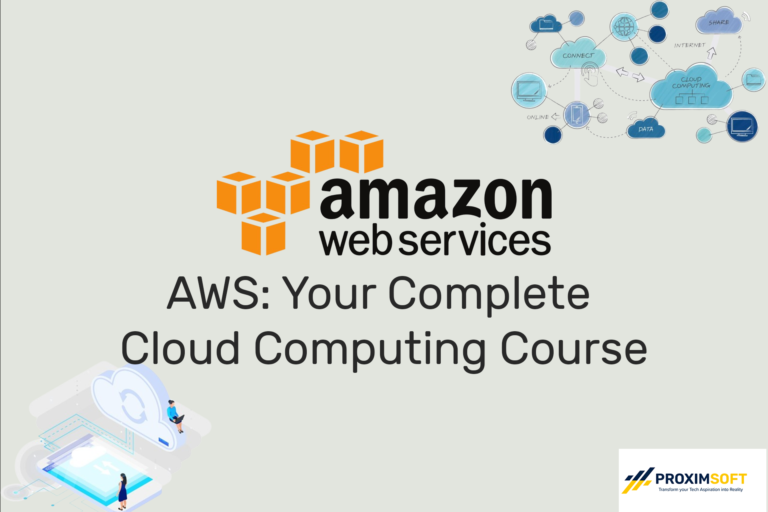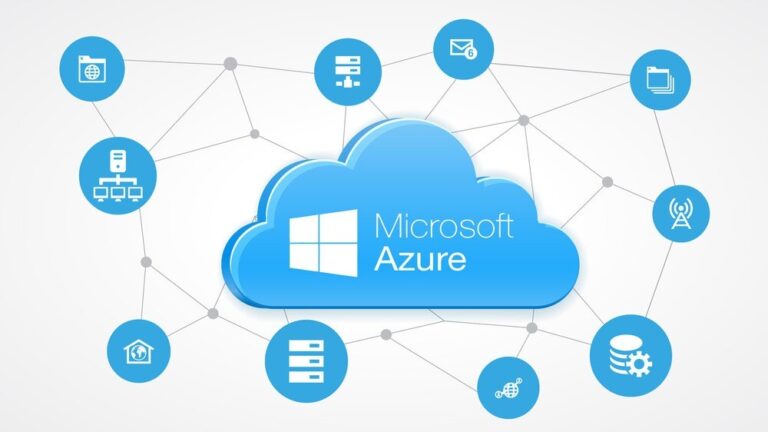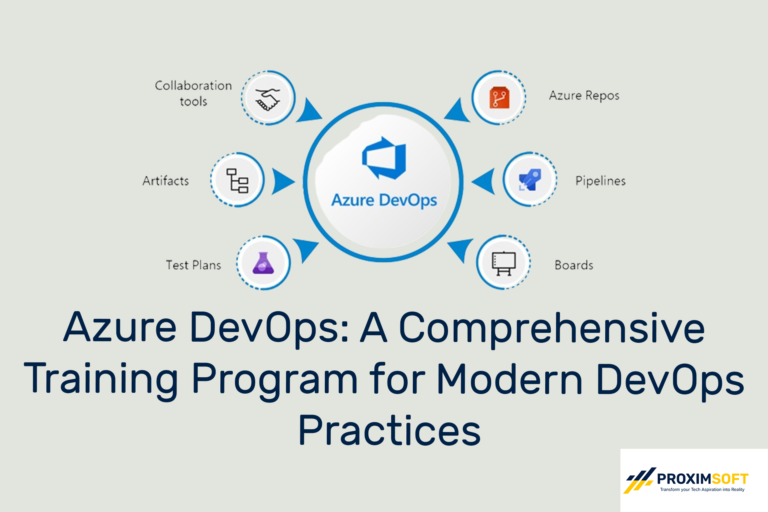Mastering Cloud-Based ETL and Data Integration: Azure Data Factory Course

Welcome to Proximsoft’s Azure Data Factory Course, your go-to path for mastering cloud-based ETL and data integration services. Our carefully designed curriculum is here to empower learners with the skills to effortlessly create, schedule, and optimize data-driven workflows using Azure Data Factory.
In this transformative course, participants, will explore the fundamental aspects of cloud-based ETL processes, discovering the advanced capabilities of Azure Data Factory. Join us to uncover the full potential of simplifying data handling and transformation in the ever-evolving world of cloud computing.
Why Learn Azure Data Factory?
- As organizations increasingly adopt cloud solutions, there is a growing demand for professionals with expertise in cloud-based data integration and orchestration, making Azure Data Factory a valuable skill in the job market.
- Azure is a major player in the cloud computing space. Specializing in Azure services, including Azure Data Factory, can make you stand out among professionals in the field.
- With smooth integration with big data technologies like Azure HDInsight and Azure Databricks, knowledge of Azure Data Factory can lead to opportunities in big data processing and analytics.
- Proficiency in Azure Data Factory can be a stepping stone for career progression. It may open doors to more senior roles such as Data Architect or Cloud Solutions Architect.
- Azure Data Factory skills are transferable across various industries, giving you the flexibility to work in different domains such as finance, healthcare, e-commerce, and more.
| Mode of Training | Online live Interactive sessions |
| Duration of the Training | 6 weeks |
| Training duration per day | 60 – 90 min session |
| Software Access | Software will be installed/server access will be provided, whichever is possible |
| Training Materials | Soft copy of the material will be provided during the training |
| Training fee | Depends on the Requirement |
| Resume Preparation | Yes, at the end of the course based on the JD |
| Interview Preparation | Yes, by sharing some FAQ’s |
| Mock calls | Yes, 2 Technical Mock calls |
| Internship Project | Yes |
| Certification | Yes, at the end of the training |
| JOB Assistance | Yes |
| JOB Support | Yes |
| Weekdays | 6AM -2 PM EST & 6-11:30 PM EST (student can pick any 1 hr) |
| Weekends | 8 AM – 12 PM EST (student can pick any 2 hrs) |
What I will learn?
- Understand the fundamentals of cloud-based ETL and data integration.
- Explore core Azure services and architectural components relevant to data workflows.
- Dive into security, privacy, compliance, and governance aspects of Azure Data Factory.
- Master the pricing models, support options, and Service Level Agreements (SLAs) associated with Azure.
- In-depth exploration of Azure SQL Database, Storage Services, Data Lake, and Azure Data Factory components.
- Work with copy activities, pipelines, linked services, datasets, and integration runtimes in Azure Data Factory.
- Practical scenarios and use cases to apply your knowledge in real-world scenarios.
Course Content
Module 1: Cloud Computing Concepts
- What is the “Cloud”?
- Why cloud services
- Types of cloud models
- Deployment Models
- Characteristics of cloud computing
- On-demand self-service
- Broad network access
- Multi-tenancy and resource pooling
- Rapid elasticity and scalability
- Measured service
- Cloud Data Warehouse Architecture
- Shared Memory architecture
- Shared Disk architecture
- Shared Nothing architecture
Module 2: Core Azure services
- Core Azure Architectural components
- Core Azure Services and Products
- Azure solutions
- Azure management tools
Module 3: Security, Privacy, Compliance
- Securing network connectivity
- HdInsights Overview.
- Core Azure identity services
- Security tools and features
- Azure Governance methodologies
- Monitoring and reportingS
- Privacy, compliance, and data protection standards
Module 4:Azure Pricing and Support
- Azure subscriptions
- Planning and managing costs
- Azure support options
- Azure Service Level Agreements (SLAs)
- Service Lifecycle in Azure
Module 5: Azure SQL Database
- Introduction Azure SQL Database
- Comparing Single Database
- Managed Instance
- Creating and Using SQL Server
- Creating SQL Database Services
- Azure SQL Database Tools
- Migrating on premise database to SQL Azure
- Purchasing Models
- DTU service tiers
- vCore based Model
- Serverless compute tier
- Service Tiers
- General purpose / Standard
- Business Critical / Premium
- Hyperscale
- Deployment of an Azure SQL Database
- Elastic Pools.
- What is SQL elastic pools
- Choosing the correct pool size
- Creating a New Pool
- Manage Pools
- Monitoring and Tuning Azure SQL Database
- Configure SQL Database Auditing
- Export and Import of Database
- Automated Backup
- Point in Time Restore
- Restore deleted databases
- Long-term backup retention
- Active Geo Replication
- Auto Failover Group
Module 6: Azure Storage Service
- Storage Service and Account
- Creating a Storage Account
- Standard and Premium Performance
- Understanding Replication
- Hot, Cold and Archive Access Tiers
- Working with Containers and Blobs
- Types of Blobs
- Block Blobs,
- Append Blobs
- Page Blobs
- Blob Metadata
- Soft Delete
- Azure Storage Explorer
- Access blobs securely
- Access Key
- Account Shared Access Token
- Service Shared Access Token
- Shared Access Policy
- Storage Service Encryption
- Azure Key Vault
Module 7: Azure Data Lake
- Introduction to Azure Data Lake
- What is Data Lake?
- What is Azure Data Lake?
- Data Lake Architecture?
- Working with Azure Data Lake
- Provisioning Azure Data Lake
- Explore Data Lake Analytics
- Explore Data Lake Store
- Uploading Sample File
- Using Azure Portal
- Using Storage Explorer
- Using Azure CLI
Module 8: Azure Data Factory
- What is Data Factory?
- Data Factory Key Components
- Pipeline and Activity
- Linked Service o Data Set
- Integration Runtime Provision Required Azure Resources
- Create Resource Group
- Create Storage Account
- Provision SQL Server and Create Database
- Provision Data Factory
Module 9: Working with Copy Activity
- Understanding Data Factory UI
- Copy Data from Blob Storage to SQL Database
- Copy data from storage account to storage account
- Create Linked service o Create Dataset
- Create Pipeline ∙ Integration Service
- Copy Data from on-premise SQL Server to Blob Storage Working with Activities
- Understanding Lookup Activity
- Understanding for Each Activity
- Filter Activity
- Get Metadata Activity Azure
- Lift and Shift
- Provisioning Azure – SSIS Integration Runtime
- Execute SSIS Packages from Azure
- Execute SSIS Packages from SSISDB Triggers,
- Monitoring Pipeline
- Debug Pipeline
- Trigger pipeline manually
- Monitor pipeline
- Trigger pipeline on schedule
Module 10 : Practical Scenarios and Use Cases
- ADF Introduction
- Important Concepts in ADF
- Create Azure Free Account for ADF
- Integration Runtime and Types
- Integration runtime in ADF-Azure IR
- Create Your First ADF
- Create Your First Pipeline in ADF
- Azure Storage Account Integration with ADF
- Copy multiple files from blob to blob
- Filter activity __ Dynamic Copy Activity
- Get File Names from Folder Dynamically
- Deep dive into Copy Activity in ADF
- Copy Activity Behavior in ADF
- Copy Activity Performance Tuning in ADF
- Validation in ADF
- Get Count of files from folder in ADF
- Validate copied data between source and sink in ADF
- Azure SQL Database integration with ADF
- Azure SQL Databases – Introduction Relational databases
- Creating Your First Azure SQL Database
- Deployment Models
- Purchasing Modes
- Overwrite and Append Modes in Copy Activity
- Full Load in ADF
- Copy Data from Azure SQL Database to BLOB in ADF
- Copy multiple tables in Bulk with Lookup & ForEach in Data Factory
- Logging and Notification Azure Logic Apps
- Log Pipeline Executions to SQL Table using ADF
- Custom Email Notifications Send Error notification with logic app
- Use Foreach loop activity to copy multiple Tables- Step by Step Explanation
- Incremental Load in ADF
- Incremental Load or Delta load from SQL to Blob Storage in ADF
- Multi Table Incremental Load or Delta load from SQL to Blob Storage
- Incrementally copy new and changed files based on Last Modified Date
- Azure Key Vault integration with ADF
- Azure Key Vault, Secure secrets, keys & certificates in Azure Data
- ADF Triggers:
- Event Based Trigger in ADF
- Tumbling window trigger dependency & parameters
- Schedule Trigger
- Self Hosted Integration Runtime
- Copying On Premise data using Azure Self Hosted integration Runtime
- Data Migration from On premise SQL Server to cloud using ADF
- Load data from on premise sql server to Azure SQL DB
- Data Migration with polybase and Bulk insert
- Copy Data from sql server to Azure SQL DW with polybase & Bulk Insert
- Data Migration from On premise File System to cloud using ADF
- Copy Data from on-premise File System to ADLS Gen2
- ToCopying data from REST API using ADF
- Loop through REST API copy data TO ADLS Gen2-Linked Service Parameters
- AWS S3 integration with ADF
- Migrate Data from AWS S3 Buckets to ADLS Gen2
- Activities in ADF
- Switch Activity-Move and delete data
- Until Activity-Parameters & Variables
- Copy Recent Files From Blob input to Blob Output folder without LPV
- Snowflake integration with ADF
- Copy data from Snowflake to ADLS Gen2
- Copy data from ADLS Gen2 to Snowflake
- Azure CosmosDB integration with ADF
- Copy data from Azure SQLDB to CosmosDB
- Copy data from blob to cosmosDB
- Advanced Concepts in ADF
- Nested ForEach -pass parameters from Master to child pipeline
- High Availability of Self Hosted IR &Sharing IR with other ADF
- Data Flows Introduction
- Azure Data Flows Introduction
- Setup Integration Runtime for Data Flows
- Basics of SQL Joins for Azure Data Flows
- Joins in Data Flows
- Aggregations and Derive Column Transformations
- Joins in Azure DataFlows
- Advanced Join Transformations with filter and Conditional Split
- Data Flows – Data processing use case1
- Restart data processing from failure
- Remove Duplicate Rows &Store Summary Credit Stats
- Difference Between Join vs.Lookup Transformation& Merge Functionality
- Dimensions in Data Flows
- Slowly Changing Dimension Type1 (SCD1) with HashKey Function
- Flatten Transformation
- Rank, Dense_Rank Transformatios
- Data Flows Performance Metrics and Data Flow Parameters
- How to use pivot and unpivot Transformations
- Data Quality Checks and Logging using Data Flows
- Batch Account Integration with ADF
- Custom Activity in ADF
- Azure Functions Integration with ADF
- Azure HDInsight Integration with ADF
- Azure HDInsight with Spark Cluster
- Azure Databricks Integration with ADF
- ADF Integration with Azure Databricks
- Azure Data Lake Analytics integration with ADF


Course level:All Levels
Course Duration: 30h
Requirements
- Basic Knowledge of Cloud Computing
- Understanding of Data Concepts
- SQL Skills
- Understanding of Data Formats
Talk to Our Career Advisor
FAQ'S
Azure Data Factory is a cloud-based data integration service that allows you to create, schedule, and manage data pipelines, facilitating the ETL (Extract, Transform, Load) processes in a scalable and efficient manner within the Azure ecosystem.
Proficiency in Azure Data Factory is in high demand as organizations adopt cloud solutions. This course opens up opportunities in cloud-based data integration, big data processing, and analytics. It can also serve as a stepping stone for career progression into roles such as Data Architect or Cloud Solutions Architect.
Yes, the course content is regularly updated to align with the latest features and updates in the Azure ecosystem. Participants can expect to learn using the most current tools and services.
While not mandatory, some programming skills, particularly in languages like Python, can be beneficial. Azure Data Factory supports data transformation using various languages, providing flexibility for both beginners and those with programming experience.
Yes, the course provides insights into integrating Azure Data Factory with various third-party tools to enhance the overall data processing and analytics capabilities. Topics include connecting with external services, APIs, and optimizing workflows with external tools for a comprehensive skill set.




